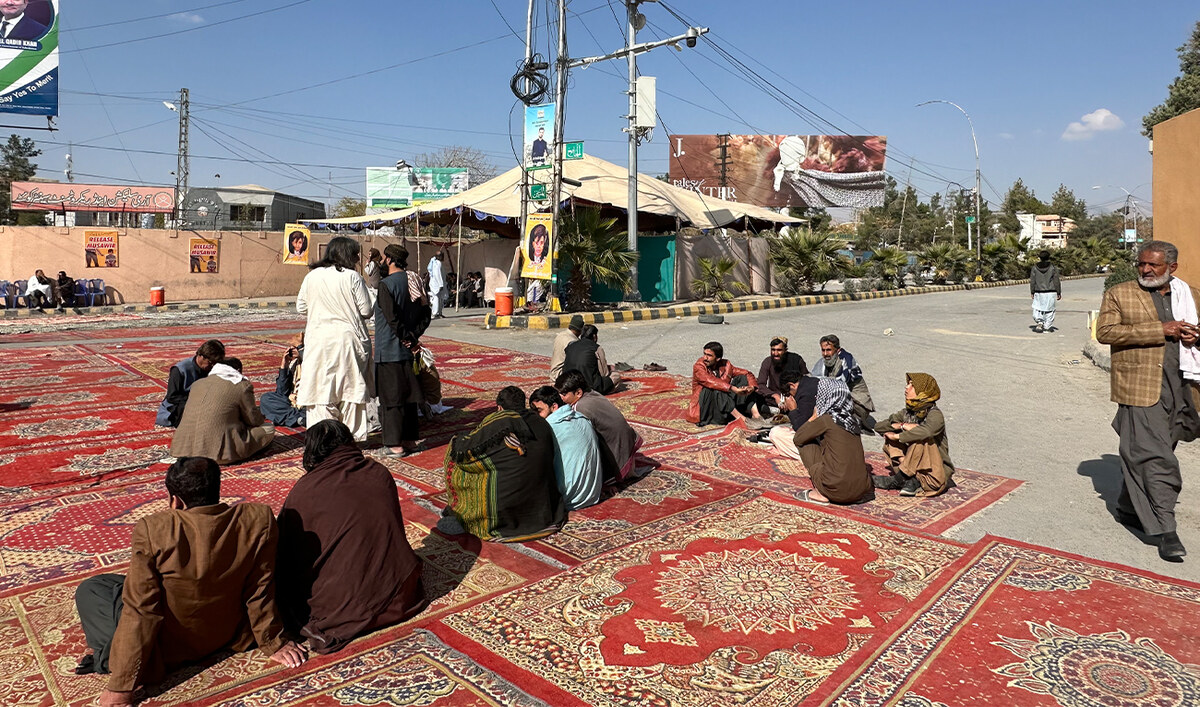FAISALABAD: Rana Shaukat Ali squatted over the graves of his five children in the eastern Pakistani city of Faisalabad and wept quietly.
Twelve years ago, his three sons and two daughters were among 68 people killed in a militant attack on the bi-weekly Samjhauta Express train service between Delhi and Lahore. The investigation lasted years, initially centring on the Pakistan-based Lashkar-e-Taiba militant group, and then shifting to a Hindu far-right organization in India called Abhinav Bharat.
Last Wednesday, a special court in the state of Haryana where the 2007 blast occurred dismissed a Pakistani woman’s plea to consider eyewitness accounts from her country. Then the court ruled that there was not enough evidence to convict four Hindu men accused of the attack, including Swami Aseemanand who worked for years with the far-right Rashtriya Swayamsevak Sangh (RSS) group considered the parent body of Indian’s ruling Bharatiya Janata Party (BJP).

Rana Shaukat Ali at a grocery store adjacent to their house in Faisalabad on March 31, 2019. His five children were killed in a 2007 attack on the Samjhauta Express train service between India and Pakistan. (AN photo)
So when Ali arrived at his children’s graves last Thursday as he has done every week since he buried them in 2007, he came bearing bad news.
“I have failed to bring the perpetrators of your merciless murderers to justice,” Ali said as he kneeled before the graves, the sunlight illuminating the pink burn scars on his face, leftovers of injuries sustained in the attack. “Forgive me, my children.”
Pakistan’s foreign ministry was quick to call the Indian court verdict a “travesty of justice” and a blow to the victims’ families. Indian High Commissioner to Pakistan Ajay Bisaria defended the ruling and said the court had followed due process.

Rana Shaukat Ali and his wife Rukhsana Akhtar hold up pictures of their children burnt in the 2007 Samjhauta Express train blast. Their only surviving child, daughter Aqsa Shehzadi, is seated between them on March 31, 2019. (AN photo)
The question of whether the BJP is protecting Hindu extremist groups has become a highly contentious issue ahead of India’s national elections this April-May in which Prime Minister Narendra Modi of the BJP is campaigning for a second five-year term.
Data from FactChecker, an Indian organization that tracks violence against religious minorities, shows that at least 90 percent of such crimes in the past ten years took place after Modi came to power in 2014. In most cases, the targets were Muslims and in some, Hindu right-wingers mutilated and burned the bodies of victims.
Since the court ruling many Hindu rightwing groups have come out to say accusations of rising "Hindu terror" are a myth.

Rana Shaukat Ali in a family photo with his children before the 2007 Samjhauta Express blast. Two coaches of the bi-weekly train that runs between New Delhi and Lahore caught fire late on Feb. 19, 2007, after two improvised explosive devices exploded. (AN photo)
“The verdict will certainly benefit right wing political groups ahead of general elections,” Ashoke Randhawa, the president of the Delhi-based South Asian Forum for People Against Terror, said.
“What kind of justice system wouldn’t bother to call me as an eyewitness to give testimony?” Ali asked, saying he had travelled to India several times after the attack in the hope of becoming a witness in the case.
At his house in Faisalabad, he leafed through photographs of his deceased children as his only surviving child, a daughter Aqsa Shehzadi, sat quietly by his side.
The family was on their way back to Pakistan after three weeks spent visiting relatives in India’s Delhi and Ghaziabad when the attack occurred on February 19, 2007. Ali recalled waking up in the train to the the sound of a muffled blast. As the carriage filled with smoke, he jumped into a second carriage but his family remained behind.

17-year old Ayesha Tabassum who was burnt to death in the 2007 Samjhauta Express blast. (AN photo)
Panicked passengers were finally able to stop the train at Diwana railway station near Panipat, Ali said, but the carriage in which his children were seated was engulfed in flames by then. He tried to enter the coach to rescue them but his body caught fire and he was thrown back by the sharp flames.
When Ali finally found his children, they “were squeezed like roasted chickens under their seats.”
“Later people told me they had heard the voices of children from inside the carriage screaming, ‘father please help me, help me, where are you,’” Ali said, breaking down again.
His wife Rukhsana Akhtar wiped her eyes with the edge of a checkered scarf and said she no longer had the heart to visit her children’s graves.
“I don’t have the heart to tell my children about the verdict,” she said. “I don’t think I will ever be able to face the graves of my children after this decision.”

The graves of Rana Shaukat Ali’s five children as seen on March 31, 2019, at a cemetery in the textile town of Faisalabad. His three sons and two daughters were among 68 people killed in a militant attack in 2007 on the bi-weekly Samjhauta Express train service between Delhi and Lahore. (AN photo)

















